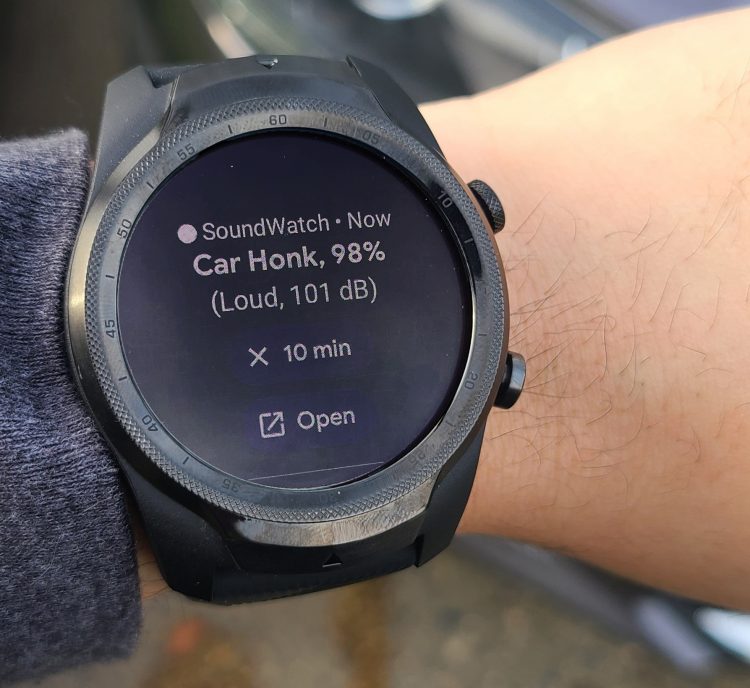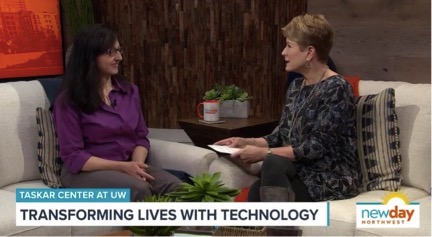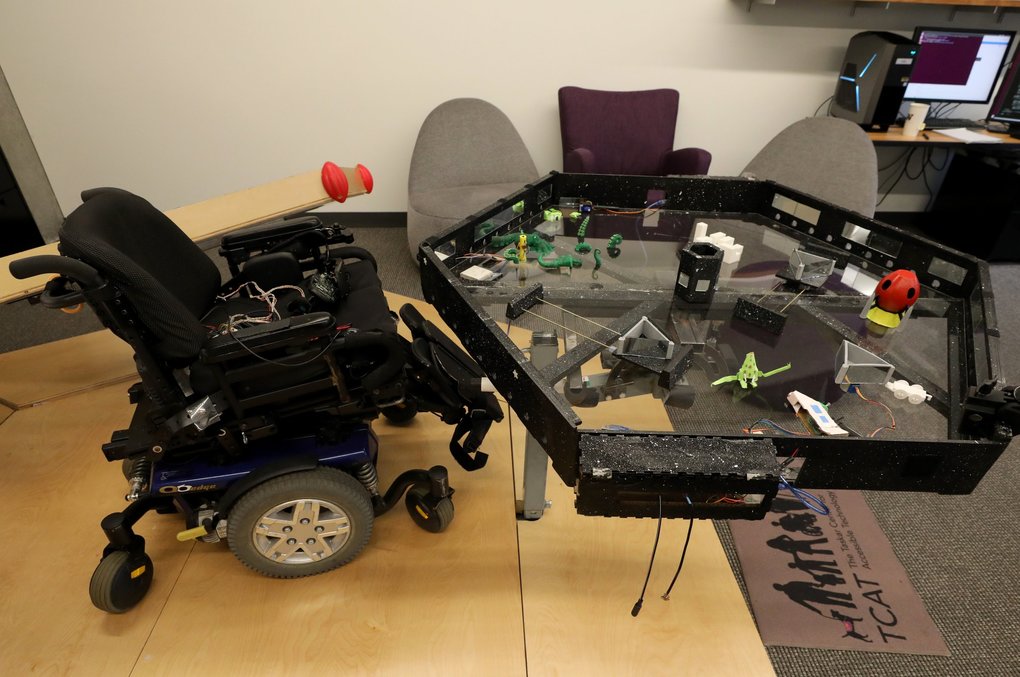Schedule of events for the 2021 CREATE Research Showcase. Open to the public, CREATE faculty and students share research in accessibility.
Category: RESEARCH
News about research from CREATE faculty and partners and peers.
SoundWatch smartwatch app alerts d/Deaf and hard-of-hearing users to sounds

October 28, 2020 | UW News UW CREATE faculty members Jon Froehlich and Leah Findlater have helped develop a smartwatch app for d/Deaf and hard-of-hearing people who want to be aware of nearby sounds. The smartwatch will identify sounds the user is interested in — such as a siren, a water faucet left on, or a bird chirping — and send the user a friendly buzz along with information. “This technology provides people with a way to experience sounds that…
Can Project Sidewalk Use Crowdsourcing to Help Seattleites Get Around?
July 23, 2019 | SeattleMet With the goal of making navigating our streets safer and easier for the mobility impaired, Jon Froehlich’s Project Sidewalk turns mapping sidewalks and improving pedestrian accessibility into a virtual game. To complete missions, users “walk” through city streets via Google Street View, labeling and rating the quality of sidewalks and features that make it easier—or tougher—to get around. They identify curb ramps, or lack thereof, assess their positioning, and point out tripping hazards. Since Froehlich…
An app for everything, but can everyone use it?

Medium | May 26, 2020 For most of us, the day seems to revolve around our phones: check email, read the news, pay bills, and get directions to the store. Mobile apps are essential in day-to-day life. Unfortunately, many apps fail to be fully accessible to people with disabilities or those who rely on assistive technologies. As one blind app user noted, using an inaccessible app is “a constant feeling of being devalued. It doesn’t matter about the stupid button that…
ASSETS Paper Impact Award
Jacob Wobbrock honored for improving touch-screen accessibility Congratulations to Jacob O. Wobbrock, a founding co-director of CREATE, for his work with Shaun Kane, PhD ’11 and Jeffrey Bigham, PhD ’09 improving the accessibility of mobile technology. The team received the 2019 SIGACCESS ASSETS Paper Impact Award for their 2008 paper, “Slide Rule: Making mobile touch screens accessible to blind people using multi-touch techniques.” The award is given biennially by the Association for Computing Machinery’s Special Interest Group on Accessible Computing and recognizes…
Designing for the fullness of human experience

Anat Caspi and Taskar Center featured on King 5’s New Day Northwest A familiar face joined Margaret Larson on New Day NW this morning. Anat Caspi, Director of the Taskar Center and Director of Translation for the UW Accessibility Center, shared recent innovations from robotics to smart, sensing environments. Technology design has taken this stance about designing for the “average” person. And in many cases that is a big design mismatch to the needs and preferences of people who are…
With AI and other tech, Anat Caspi focuses on helping people with disabilities

The Seattle Times | August 4, 2019 In her role as the director of the University of Washington’s Taskar Center for Accessible Technology, Caspi creates technology focused on people with disabilities such as motor limitations, in many instances applying artificial intelligence (AI). “It’s really about treating people as humans with different needs and preferences,” she said as a cyclist passing by rang a bell. She sees the mapping of pedestrian infrastructure — walkways, sidewalks, overpasses, underpasses and trails — as a necessary…
Jennifer Mankoff, Director
CREATE Director Dr. Jennifer Mankoff’s research focuses on accessibility broadly speaking. “In doing this work, I emphasize values such as intersectionality, and perspectives such as disability studies. For example, in the domain of Deaf/Hard of Hearing (DHH) technology, I am exploring how people who are multilingual engage with communication technology. Another focus of my work is creating general tools so that anyone can use them, such as 3D printing, knitting, and other fabrication technologies. I have led the effort to better understand both clinical and do-it-yourself (DIY) stakeholders’ use of fabrication technologies, and developed better, more usable tools for production. Together, these can enhance the capabilities and participation of all users in today’s manufacturing revolution.”
Mark Harniss, Director for Education
CREATE Associate Director, Dr. Mark Harniss’ research focuses on knowledge translation, assistive technology, and accessible design. He teaches in both the Disability Studies Program and the Rehabilitation Medicine doctoral program with an emphasis on knowledge translation and disability policy. Harniss leads projects focused on developing decision aids to support people with disabilities to request reasonable accommodations and on developing an accommodation expert support system for people who are aging.
Anat Caspi, Associate Director
CREATE Associate Director, Dr. Anat Caspi is interested in exploring ways in which collaborative commons and cooperation can challenge and transform the current economics of assistive technology and incentivize rapid development and deployment of ethically built accessible technologies. Her research focuses on engineering machine intelligent solutions for customizable real-time, responsive technologies in the context of work, play and urban street environments.
Heather Feldner, Associate Director
CREATE Associate Director, Dr. Heather Feldner’s focus is on advancing participation and health together with people with disabilities and their families by exploring the intersections between mobility, disability, and technology in a variety of personal and environmental contexts. Her research centers on the design and implementation of mobility assistive technology, including how perceptions of disability and identity emerge and evolve through technology use.
Leah Findlater, Associate Director
CREATE Associate Director, Dr. Leah Findlater is interested in how to create technologies that adapt to accommodate individual user needs and preferences, whether to improve basic interactions such as touchscreen text entry or more complex tasks such as working with machine learning models. My research goal is to ensure that the next generation of computing technologies are designed to meet the needs of the broadest range of users.
James Fogarty, Associate Director
CREATE Associate Director, Dr. James Fogarty’s broad research interests are in Human-Computer Interaction, User Interface Software and Technology, and Ubiquitous Computing. His focus is on developing, deploying, and evaluating new approaches to the human obstacles surrounding widespread everyday adoption of ubiquitous sensing and intelligent computing technologies.
Jon E. Froehlich, Associate Director
CREATE Associate Director, Dr. Jon E. Froehlich’s research focuses on designing, building, and evaluating interactive technology that addresses high value social issues such as environmental sustainability, computer accessibility, and personalized health and wellness.
Katherine M. Steele, Associate Director
CREATE Associate Director, Dr. Katherine M. Steele’s research focuses on using novel computational and experimental tools to understand human movement and improve treatment and quality of life of individuals with cerebral palsy, stroke, and other neurological disorders. Steele’s research strives to connect engineering and medicine to create solutions that can advance our understanding of human ability, but also translate research results to the clinic and daily life.
Jacob O. Wobbrock, Associate Director
CREATE Associate Director, Dr. Jacob O. Wobbrock’s research seeks to scientifically understand people’s experiences of computers and information, and to improve those experiences through design and engineering, especially for people with disabilities. His specific research topics include input & interaction techniques, human performance measurement & modeling, HCI research & design methods, mobile computing, and accessible computing.